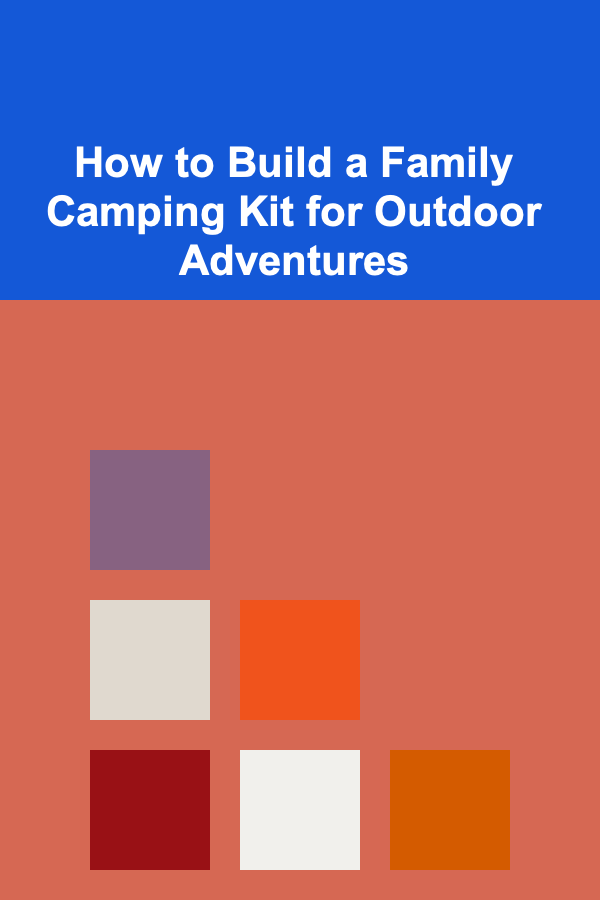
How to Build a Family Camping Kit for Outdoor Adventures
ebook include PDF & Audio bundle (Micro Guide)
$12.99$8.99
Limited Time Offer! Order within the next:

Family camping trips are one of the best ways to bond, escape the distractions of daily life, and immerse yourselves in nature. Whether it's a weekend getaway to the nearest national park or a week-long journey into the wilderness, a successful family camping experience starts with good preparation. One of the most crucial aspects of that preparation is having the right gear. A well-equipped family camping kit can make the difference between a comfortable, enjoyable adventure and a stressful, uncomfortable one.
In this article, we'll take a deep dive into how to build a comprehensive family camping kit. This will include everything from choosing the right tents and sleeping bags to ensuring your meals are well-planned and everyone stays safe and entertained. Every family is unique, so your camping kit should be tailored to your specific needs, but the following guidelines will help you create a solid foundation.
Choosing the Right Tent
The tent is arguably the most important item in any camping kit, as it will be your family's shelter for the duration of the trip. When selecting a tent, consider the following:
Size and Capacity
Family tents come in a variety of sizes, from 2-person tents to massive 10-person tents. For most families, a tent with a capacity of 4-6 people is ideal. However, if you have younger children or plan on spending a lot of time inside, consider going one size larger to ensure everyone has plenty of space.
- 4-Person Tent: Ideal for small families or a couple with one child.
- 6-Person Tent: Provides extra space for families with multiple children, or those who prefer additional storage space for gear.
- 8-Person Tent and Above: Perfect for larger families or those who want plenty of space for gear, cooking, and other activities inside the tent.
Weather Resistance
Consider the type of climate you'll be camping in. Some tents are designed for warmer, summer weather, while others are made to withstand colder temperatures and harsher conditions. If you plan on camping in the rain or cooler weather, choose a tent with a full rainfly and a waterproof floor to keep your family dry.
Setup Time
A tent that is easy to set up can make your arrival at the campsite much less stressful. Look for tents with simple, color-coded poles and clear instructions. Some tents even offer instant setup features, which allow you to pitch the tent in just a few minutes.
Ventilation
Proper airflow is important, especially on warmer nights. Look for tents with multiple mesh windows and ventilation panels to ensure the air inside doesn't become too stuffy or hot. If you're camping in a location with lots of mosquitoes, a tent with screens will keep the bugs out while still allowing for airflow.
Sleeping Gear
After a long day of hiking, fishing, or exploring, a good night's sleep is essential. Here's what you'll need for comfortable sleeping arrangements:
Sleeping Bags
The right sleeping bag is essential for staying warm and comfortable. Family sleeping bags typically come in two types: mummy bags, which are snug and insulated, and rectangular bags, which provide more room to move. The type of sleeping bag you choose should depend on the climate and personal preferences.
- Temperature Rating: Sleeping bags are typically rated for various temperature ranges. Make sure to choose a sleeping bag with a rating appropriate for the season and location. If you're camping in cold weather, opt for a sleeping bag rated for lower temperatures.
- Material: Sleeping bags can be filled with synthetic fibers or down. Down sleeping bags are lightweight and compressible but are less effective when wet. Synthetic bags retain warmth even when damp and are usually more affordable.
- Size: Sleeping bags come in various sizes, including options for kids. Ensure that everyone in the family has a bag that fits well and provides comfort.
Sleeping Pads
Sleeping pads provide insulation from the cold ground and offer added comfort. There are three main types of sleeping pads:
- Air Pads: Lightweight and comfortable, but they may require inflating and can be punctured more easily.
- Foam Pads: Durable and provide great insulation, but they tend to be bulkier and less comfortable.
- Self-Inflating Pads: These combine the best of both worlds, offering comfort and ease of use.
Ensure that each member of the family has their own sleeping pad for a comfortable night's sleep.
Pillows
While some campers use a stuff sack filled with clothes as a pillow, bringing a lightweight camping pillow can make a big difference in comfort. Many camping pillows are inflatable, so they pack down small but can still provide adequate support for your head and neck.
Cooking and Food Prep
Cooking outdoors can be one of the most enjoyable aspects of a camping trip, especially if you have the right gear. Here's what to consider when preparing your family camping kitchen:
Portable Stove or Campfire Setup
Most camping trips will require some form of cooking. You have two options for preparing meals:
- Portable Stoves: Gas or multi-fuel stoves are compact, efficient, and easy to use. Choose a stove with enough burners to cook for your entire family.
- Campfires: If campfires are allowed in the area you're camping in, you can cook meals over the fire using a grate or tripod for hanging pots and pans. Always check the local regulations, as fire bans can be in place in some areas.
Cookware
A simple set of cookware will do for most family camping trips. Look for cookware made from lightweight materials like aluminum or titanium. The essentials include:
- Pots and Pans: A small pot for boiling water and a frying pan for cooking meals like eggs and bacon are must-haves.
- Utensils: Don't forget a spatula, tongs, and cooking spoons. Also, bring a set of plates, bowls, and cutlery for each family member.
- Cups and Mugs: Reusable cups or mugs are essential for hot drinks like coffee or cocoa.
Food Storage
Keeping food fresh and organized is essential. A cooler with plenty of ice packs will keep perishable items safe. Additionally, bring airtight containers for dry foods like pasta, rice, and snacks. Make sure you store food properly to avoid attracting animals to your campsite.
Cleaning Supplies
You'll need cleaning supplies to keep your campsite tidy. Bring a small bottle of dish soap, a sponge or scrub brush, and a few microfiber towels for drying dishes. A portable sink or basin can also help with washing dishes, especially when water sources are limited.
Clothing and Weather Protection
The weather can change quickly when you're camping, so it's essential to be prepared for a variety of conditions. Layering is key when it comes to outdoor clothing.
Base Layers
Start with moisture-wicking base layers made from materials like merino wool or synthetic fabrics. These layers keep sweat off your skin and help regulate body temperature. Make sure to pack extra socks and underwear for the entire family.
Insulating Layers
For colder weather, you'll need insulating layers such as fleece or down jackets. These will keep your family warm when the temperature drops in the evenings or during early morning hikes.
Outer Layer
A waterproof and windproof outer layer is crucial for staying dry in rain or snow. A good-quality rain jacket, pants, and poncho will keep everyone comfortable even in the wettest conditions.
Footwear
Sturdy hiking boots or shoes are essential for outdoor adventures. Make sure they are broken in before your trip to avoid blisters. For lighter hikes, comfortable sneakers or trail shoes may suffice.
Hats and Gloves
Hats protect from sun exposure during the day and provide warmth at night. A wide-brimmed hat for sunny days and a warm beanie or gloves for cold weather are key accessories for a camping trip.
Safety and First Aid
Safety should always be a top priority when camping with your family. Be sure to pack a well-stocked first aid kit and know how to use the items inside it. Here's a checklist of essential safety gear:
First Aid Kit
A comprehensive first aid kit should include:
- Bandages and gauze
- Antiseptic wipes and ointments
- Pain relievers (ibuprofen, aspirin)
- Tweezers (for splinters or ticks)
- Scissors and tape
- Any necessary prescription medications for family members
- An emergency whistle
- Sunscreen and lip balm with SPF
Flashlights and Headlamps
Bring a reliable flashlight or headlamp for each family member. LED headlamps are ideal because they allow you to keep your hands free while hiking or cooking. Don't forget spare batteries.
Maps and Compass
Even if you're relying on GPS for navigation, it's a good idea to have a paper map and compass as a backup in case of device failure or a lack of signal.
Multi-tool
A versatile multi-tool with a knife, pliers, screwdriver, and other useful features can come in handy in a wide range of situations, from fixing gear to preparing food.
Entertainment and Comfort
When camping with the family, it's important to keep everyone entertained and comfortable during downtime. Here are some ideas:
Games and Activities
Bring along family-friendly games like card games, board games, or outdoor games like a frisbee or a kite. If you're near water, consider fishing poles, inflatable kayaks, or paddleboards for fun family activities.
Camp Chairs
Comfortable camp chairs are essential for lounging around the campfire or simply relaxing outside the tent. Look for chairs that fold down small and are easy to carry.
Blankets
A cozy blanket is perfect for chilly nights around the campfire or for snuggling inside the tent. Choose a blanket that is lightweight but warm and easy to pack.
Conclusion
Building a family camping kit requires careful consideration of the needs and preferences of your family members, as well as the conditions of the environment you'll be camping in. By choosing the right gear, preparing for a range of weather conditions, and ensuring everyone stays safe, entertained, and comfortable, you can create a memorable outdoor adventure for the whole family. With the right camping kit, your family will be well-equipped to enjoy the beauty of the outdoors and make lasting memories in nature.
Reading More From Our Other Websites
- [Home Space Saving 101] How to Optimize Vertical Storage Solutions in Tight Spaces
- [Personal Care Tips 101] How to Choose the Best Sunscreen for Dry Skin
- [Personal Care Tips 101] How to Choose the Best Shaving Cream for Sensitive Skin
- [Gardening 101] From Soil to Mulch: Simple Steps to a Year‑Round, Low‑Maintenance Landscape
- [Organization Tip 101] How to Keep Your Water Sports Gear Organized and Dry
- [Toy Making Tip 101] Best Safety‑First Practices When Building DIY Electronic Toys for Todtoddlers
- [Home Storage Solution 101] How to Organize a Small Bathroom with Clever Tricks
- [Personal Care Tips 101] How to Use Your Toothbrush to Prevent Bad Breath
- [Whitewater Rafting Tip 101] How a Proper Rafting Helmet Can Prevent Injuries on Wild Rivers
- [Weaving Tip 101] Beginner's Guide: Starting Your First Weave and Knit Projects Simultaneously

How to Prevent Break-ins with Simple Home Security Upgrades
Read More
How to Prioritize Home Expenses in Your Monthly Budget
Read More
How To Appreciate the Craft of Songwriting
Read More
10 Tips for Incorporating Beads into Your Weaving
Read More
10 Tips for Chess Players to Overcome Tilt
Read MoreRent Expense Tracking for Digital Nomads: Apps & Strategies
Read MoreOther Products

How to Prevent Break-ins with Simple Home Security Upgrades
Read More
How to Prioritize Home Expenses in Your Monthly Budget
Read More
How To Appreciate the Craft of Songwriting
Read More
10 Tips for Incorporating Beads into Your Weaving
Read More